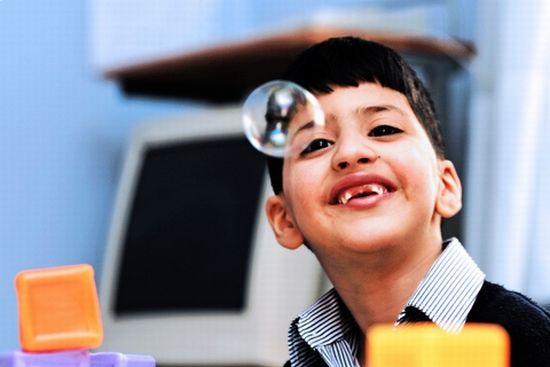Autism is a neurodevelopmental disorder which causes poor interaction and communication skills in children. Autism is yet incurable. Children with autism often show restricted and repetitive behavior, and most of the time these signs appear in a child in a very early age. Autism could not be distinguished by a single symptom, and the exact causes of autism are yet unknown. But, research results show that there are so many factors which ultimately lead to autism. There’s a chance that strong genetic factors could be behind this. Though the severity of the symptoms of autism varies from child to child, but there are some core symptoms related that appear in almost every autistic patient. It is not known exactly how many children have this disorder, but a report from CDC (Center for Disease Control and Prevention, US) says approximately 9 per 1,000 children in the United States are diagnosed with autism.
Autism symptoms in children
Parents of autistic children begin to understand that there is something wrong with their child before he reaches the age of two years. This is because the autistic children don’t talk or play like the normal children, and often they don’t give any sign that they can hear. When they grow up a bit, their problem of communicating with other people gets stronger. Autistic children could be overly sensitive. They form an unusual sort of attachment with other objects rather than their parents. They often perform repeated body movements and easily get distressed by any change of their routine. Usually autistic children face difficulties in motor activities too.
1. Communication problem
a) Language development process is very slow, or in some cases, not at all.
b) Use gestures to communicate instead of words.
c) Not able to start or maintain a conversation with anyone.
d) Can not adjust eye-gazing.
e) No facial expressions.
f) Can not refer to himself correctly.
g) Couldn’t form social bonding with anyone.
h) Use nonsense rhyming.
i) Unable to understand other people’s feelings.
2. Poor Interaction Skills
a) Very withdrawn nature.
b) Does not like to play with others.
c) Does not make friends.
d) Shows a lack of empathy.
e) Prefers to be alone.
f) May not respond to eye contact or smiles.
3. Response to sensory information
a) Have a heightened or low response to pain.
b) Often find normal noises painful.
c) Often licks objects.
d) May withdraw from physical contact.
4. Behavioral problems
a) Attention span is very short.
b) Either over-active or very passive.
c) Shows aggressive behavior sometimes.
d) Strong need for sameness.
e) Extreme wish to follow routines.
f) Stereotyped behaviors like body rocking and hand flapping.
g) Restricted behaviors like watching a single television program or playing with a single toy.
Autism symptoms in adults
There are two types of autistic adults: high functioning and low functioning. Low functioning autistic adults could not live without constant care, they could not fulfill their needs without some caretaker’s help. On the other hand, high functioning autistic adults can become very successful at work, though they would need some medical help or some support from caretakers, but they are highly able to lead almost a normal life as adults. Some of the autistic children can overcome their inabilities partially, and as an adult they can manage to work and make a living on their own; but they still need help from others to maintain everything smoothly. It is more like achieving some partial independence. But this percentage of autistic adults, who can work, is very low; approximately 33% only. This percentage is mainly based on the intelligence of the autistic adult. Some autistic people could never learn how to speak, so those adults unable to speak, need a lot more attention. Autistic adults with low intelligence mostly live their lives under the supervision of some other person.




